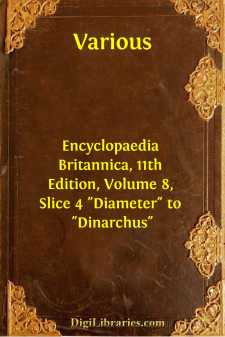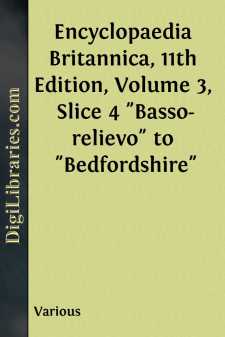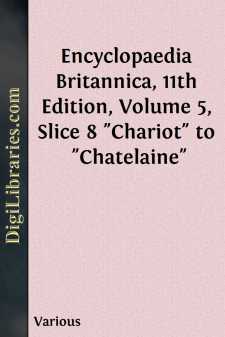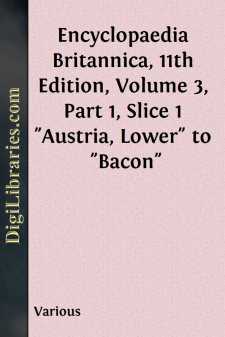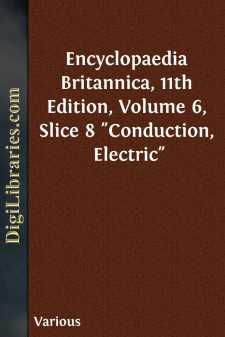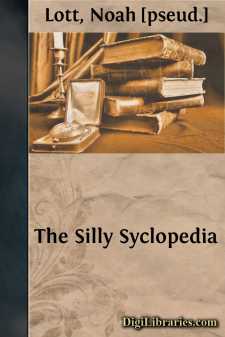Reference
- Atlases 1
- Bibliographies & Indexes 10
- Catalogs 55
- Dictionaries 1
- Encyclopedias
- Etiquette 14
- Handbooks & Manuals 19
- Heraldry 2
- Quotations 9
Encyclopedias Books
Sort by:
by:
Various
BEDLAM, or Bethlehem Hospital, the first English lunatic asylum, originally founded by Simon FitzMary, sheriff of London, in 1247, as a priory for the sisters and brethren of the order of the Star of Bethlehem. It had as one of its special objects the housing and entertainment of the bishop and canons of St Mary of Bethlehem, the mother-church, on their visits to England. Its first site was in...
more...
by:
Various
DEMIJOHN, a glass bottle or jar with a large round body and narrow neck, encased in wicker-work and provided with handles. The word is also used of an erthenware jar, similarly covered with wicker. The capacity of a demijohn varies from two to twelve gallons, but the common size contains five gallons. According to the New English Dictionary the word is an adaptation of a French Dame Jeanne, or Dame...
more...
by:
Various
DIAMETER (from the Gr. διì, through, μÃτρον, measure), in geometry, a line passing through the centre of a circle or conic section and terminated by the curve; the “principal diameters” of the ellipse and hyperbola coincide with the “axes” and are at right angles; “conjugate diameters” are such that each bisects chords parallel to the other. The diameter of a quadric...
more...
by:
Various
BANKS, GEORGE LINNAEUS (1821-1881), British miscellaneous writer, was born at Birmingham on the 2nd of March 1821. After a brief experience in a variety of trades, he became at the age of seventeen a contributor to various newspapers, and subsequently a playwright, being the author of two plays, a couple of burlesques and several lyrics. Between 1848 and 1864 he edited in succession a variety of...
more...
by:
Various
BASSO-RELIEVO (Ital. for âlow reliefâ), the term applied to sculpture in which the design projects but slightly from the plane of the background. The relief may not project at all from the original surface of the material, as in the sunken reliefs of the Egyptians, and may be nearly flat, as in the Panathenaic procession of the Parthenon. In the early 19th century the term basso-relievo, or...
more...
by:
Various
CHARIOT(derived from an O. Fr. word, formed fromchar, a car), in antiquity, a conveyance (Gr.á¼â¦ρμα, Lat.currus) used in battle, for the chase, in public processions and in games. The Greek chariot had two wheels, and was made to be drawn by two horses; if a third or, more commonly, two reserve horses were added, they were attached on each side of the main pair by a single trace fastened...
more...
by:
Various
AUSTRIA, LOWER (Ger. Niederösterreich or Österreich unter der Enns, "Austria below the river Enns"), an archduchy and crownland of Austria, bounded E. by Hungary, N. by Bohemia and Moravia, W. by Bohemia and Upper Austria, and S. by Styria. It has an area of 7654 sq. m. and is divided into two parts by the Danube, which enters at its most westerly point, and leaves it at its eastern...
more...
by:
Various
CONDUCTION, ELECTRIC. The electric conductivity of a substance is that property in virtue of which all its parts come spontaneously to the same electric potential if the substance is kept free from the operation of electric force. Accordingly, the reciprocal quality, electric resistivity, may be defined as a quality of a substance in virtue of which a difference of potential can exist between different...
more...
by:
Various
CONSTANTINE PAVLOVICH (1779-1831), grand-duke and cesarevich of Russia, was born at Tsarskoye Selo on the 27th of April 1779. Of the sons born to the unfortunate tsar Paul Petrovich and his wife Maria Feodorovna, née princess of Württemberg, none more closely resembled his father in bodily and mental characteristics than did the second, Constantine Pavlovich. The direction of the boy’s upbringing...
more...
PREFACE. Some eighteen months ago I took this brilliant bunch of brain burrs to my esteemed Publisher and with much enthusiasm invited him to spend a lot of money thereon. The Main Stem in the Works informed me that he had his fingers on the public pulse and just as soon as that pulse began to jump and yell for something from my fiery pen he would throw the Silly Syclopedia at it. Then he placed my MS....
more...




